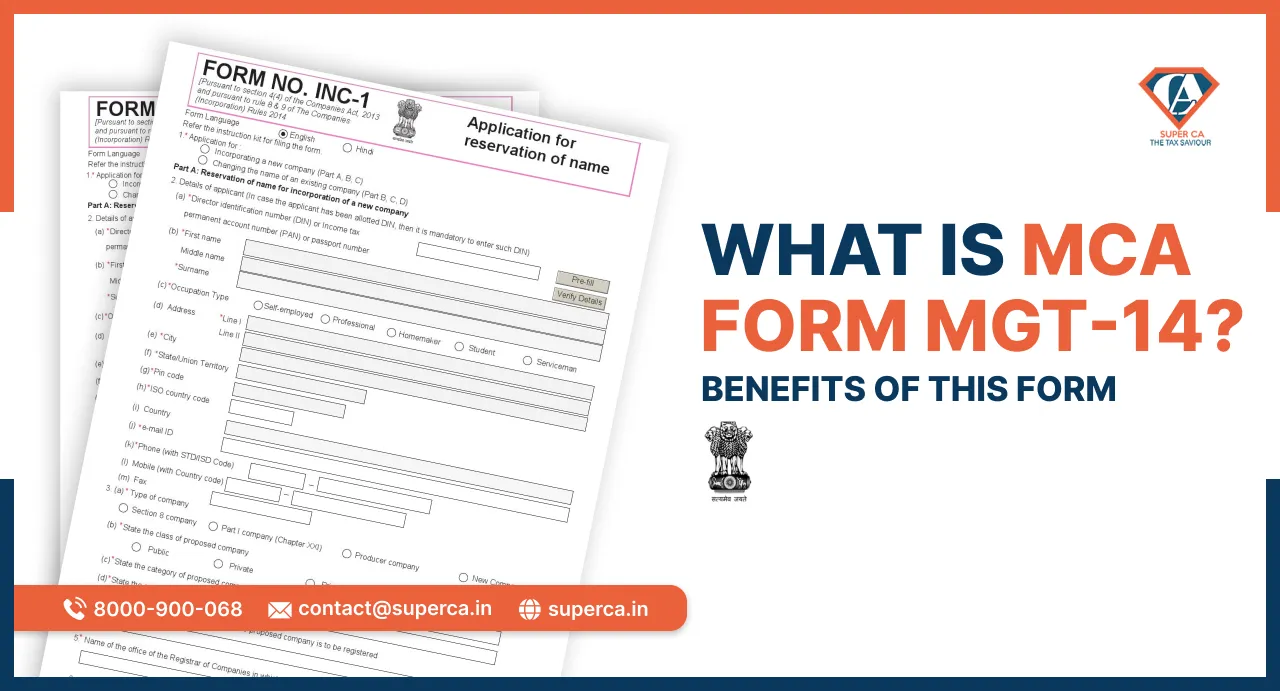What is MCA Form MGT-14? Benefits of this Form
- Posted By SuperCA
- On 26 May

The Companies Act of 2013 was the one that introduced MCA Form MGT-14. The main objective of the MCA Form MGT-14 was to file certain resolutions with the Registrar of Companies. After the MCA form MGT-14 has been passed, you will have to file these resolutions at that meeting which will be conducted by the Board of the company. In this blog, we will be discussing the resolutions that have to be filed in the MCA Form MGT-14.
Categories for Resolution Filing
The resolutions that need to be filed in the MCA Form MGT-14 are of the following categories:
- The Board Resolutions
- The Special Resolutions
- The Ordinary Resolutions
In Annexure A, board resolutions are filed,in Annexure B, special resolutions are filed and in Annexure c, ordinary resolutions are filed. Let us now go through all of the resolutions of MCA Form MGT-14.
Board Resolutions- Annexure A
Private Limited Companies need not to file this annexure however, those private limited companies that are subsidiaries of public limited organisations are not exempted from this provision. The resolutions mentioned below must be filed in the MCA Form MGT-14:
- In order to issue securities that are inclusive of debentures either in or out of India. Also, if we talk about shares, the issue of securities means the issue of a letter of Offer.
- In order to borrow money from any sort of source including a Director.
- In order to invest the funds of the company
- To either issue loans or to provide guarantee or some sort of security in respect of loans.
- In order to validate the financial statement and the report of the Board.
- In order to appoint internal Auditors.
- In order to appoint Secretarial Auditors.
- In order to appoint or remove key Managerial Personnel.
- In order to make political Contributions.
- In order to take decisions on those shareholders relating to the money that remains unpaid on their shares.
- In order to sanction a buy-back of securities under the Section 68.
- In order to expand the business of the company or organisation.
- In order to validate Mergers or Reconstruction.
- In order to take over an organisation or acquire a considerable stake in another company or organisation.
Special Resolutions- Annexure B
The resolutions that are listed below must be filed in Annexure B of the MCA Form MGT-14:
- For those companies that are registered under Section 8 to convert itself into a company of some other kind or the changes in its MOA or AOA.
- The changing of location of the registered office within the same state, but outside the local limits of the current city or village or town.
- When the jurisdiction of the registered office is changed from the existing registrar to another one but inside the same state.
- Amendments of Articles for the entrenchment of any sort of provisions of a private limited company. All the members of the private company must consent to it.
- Modifications to be made in the name of the company
- If a company has raised funds with the help of the public through the issuing of any sort of prospectus and the money that was raised remains unused, then the company is not allowed to change the object for which the money was originally raised except in the situation where a special provision is passed.
- A company can not modify the terms of a contract for which a prospectus was issued unless the approval of the concerned authority is given.
- A company can pass a special resolution in its general meeting and can issue depository receipts abroad in compliance with the conditions.
- If the shared capital of the company is categorised into different classes of shares, then the rights attached to the shares of any of the class can be modified with the help of the written consent of the authorized shareholders.or by using a special resolution.
- Private offers of the companies need the consent of the company using a special resolution.
- Issue of ‘Sweat Equity Shares’.
- Reduction of the share capital
- Buying back of shares
- Special resolutions for endorsing the schemes for the purchasing of fully paid shares for employee welfare
- Maintaining registers at any other Indian Locality.
- Re-appointing of The Independent Director.
- The members of a company are empowered to choose any company in which the directors of the company can act as directors.
- To either sell or dispose or lease the whole undertakings of the organisations
- To invest the compensations that are received by the organisation because of a merger or accumulation in trust securities.
- In order to borrow money where the borrowable amount and the previously borrowed money exceeds the total paid-up share capital barring the temporary loans acquired from the bankers of the company.
- To grant time for the repaying of any type of debt that is owned by the director.
- To approve a scheme in order to provide loans to MD or WTD.
- Investment and Loan by the company that is above 60% of the paid up capital
- Recruiting someone on the position of Managerial Personnel, given that his/her age is above 70 years.
- Remunerating to the managerial personnel if there are insufficient profits.
- A Special resolution for the closure of the company by Tribunal or Court.
- Special resolution for the closure of the organisation.
- In order to form a One person company from a private limited company
Ordinary Resolutions- Annexure c
The Annexure C of MCA Form MGT-14 is inclusive of the following ordinary resolutions:
- Changing the name according to the Registrar in case the application for reserving a name was applied using incorrect information.
- Changing the name as per the suggestion of the Central Government.
- Issuing equity shares with differentiating rights will have to be endorsed by an annexure c resolution which is passed at a general meeting of shareholders.
- A company has to either consolidate or increase its capital or sub-divide or cancel the shares which have not been taken if this act is allowed by the articles.
- A private company is not allowed the rights to offer any shares to employees under any scheme except the consent of shareholders is provided via special resolution.
- In order to transact the consideration of financial statements and the reports of the Board of Auditors and Directors, appointment of some new directors replacing those who are retiring and determining the remuneration of auditors in the Annual General Meeting using a special resolution.
- Approving a general meeting related to the issue of bonus shares.
- Approving a general meeting in order to encourage deposits from the members.
- Appointing Auditors
- Appointing Branch Auditors
- Appointing Independent Directors
- Appointing a Director by Small Shareholders
- Appointing Directors at an initial general meeting or the proposing of someone with a deposit of Rs. 1,00,000.
- Remuneration of the cost auditor is set by using an ordinary resolution at the general meeting.
- Ordinary resolution in order to enter a specified contract with the concerned party
In order to mention any sort of non-monetary transactions where the directors of the organisation or holding or associate company are involved.





